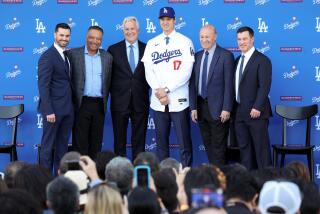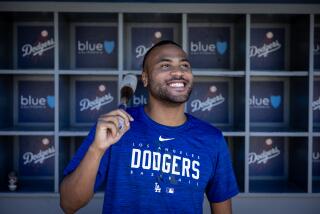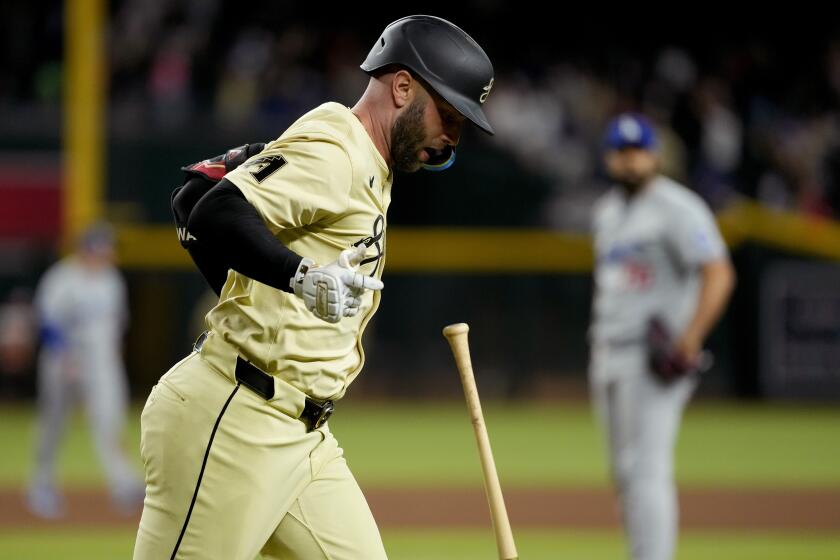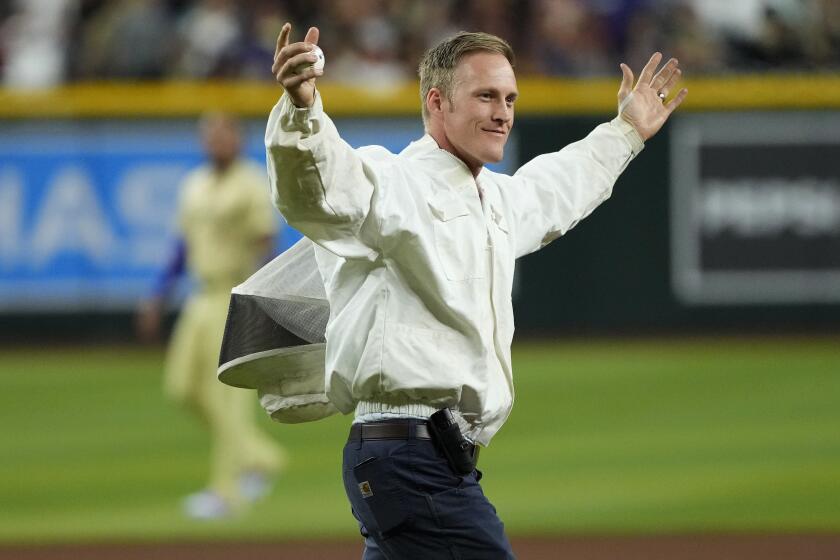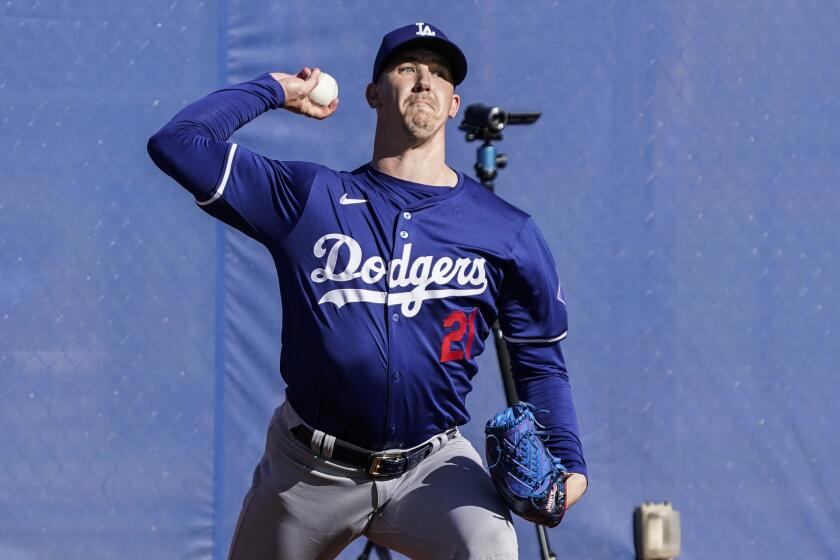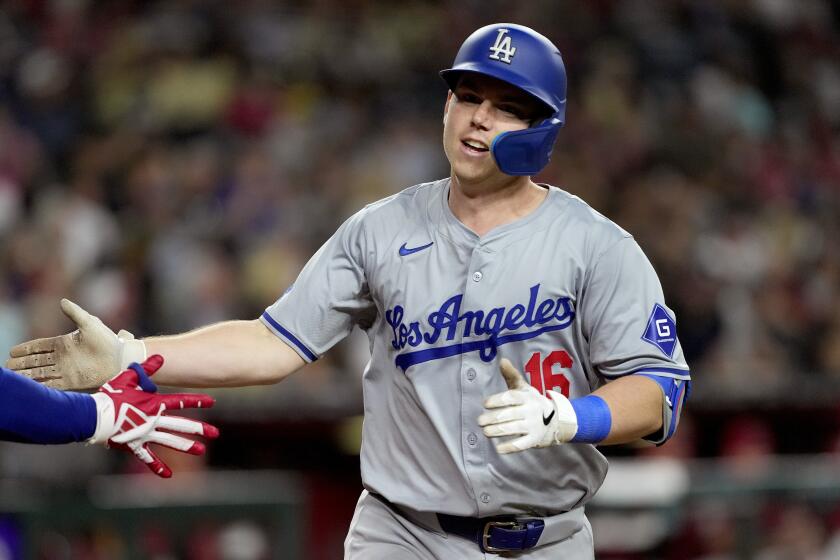Home of the EX-BRAVE
DULUTH, Ga. -- Nine tall boxes sit in the garage of Andruw Jones’ nine-bedroom house, taped up and ready to be shipped to Los Angeles. Inside are his clothes.
Almost everything else the Dodgers’ new center fielder owns will remain at his residence in suburban Atlanta, at least until he can see beyond the next two years.
Asked last week about buying a house in Los Angeles or enrolling his 4-year-old son in kindergarten next fall, Jones prefaced his responses with a conditional clause: “If I get an extension.”
To be able to answer questions about his future more definitively, Jones will first have to answer questions about whether he can recover from what he described as the toughest season of his 11-year career, played entirely so far with the Atlanta Braves.
“It’s all about this year,” he said.
Jones’ life is in Atlanta. What the 30-year-old wants to know is whether he’ll be with the Dodgers long enough to start a new one in Los Angeles. The first day of the next phase of his life will be Sunday, when he plans to report for spring training in Vero Beach, Fla.
His contract with the Dodgers is for two years and will pay him $36.2 million, the length of the deal reflecting the doubts created by his performance at the plate. Jones won his 10th Gold Glove award for fielding last season, but hit a career-low .222 with 26 home runs, down from a major league-best 51 in 2005 and 41 in 2006.
Scott Boras, Jones’ agent, noted that the short-term deal would allow Jones to quickly re-enter the free-agent market upon re-establishing his value. But Jones says he wants to avoid that, adding that he’d discuss an extension as soon as the Dodgers are ready.
“I want to be there for a while, like I was with the Braves,” Jones said.
He was called up to the majors at 19, hitting two home runs in Game 1 of the 1996 World Series. Jones stayed with the Braves from then until last September, long enough that not an eyebrow was raised when he walked into their clubhouse at Turner Field last week accompanied by his live-in personal trainer, Daniel Leoncio.
On his way to the batting cages, he bumped fists with Chipper Jones. He exchanged hugs with Brian McCann and Peter Moylan. Another former teammate asked if he still had his old locker. Jones leaned back and laughed.
“He’s a special guy,” Braves Manager Bobby Cox said. “Great in the clubhouse. You’ll never hear him pout about anything, except losing.”
For most of the off-season, Jones hit in the batting cage in the basement of his house. Throwing to him was either Braves first base coach Glenn Hubbard or strength coach Frank Fultz. When an injury put an end to Hubbard’s house calls last month, Jones went back to his old home away from home.
And the Braves didn’t mind that the enemy was using their facility three times a week?
“The enemy?” Moylan asked, shaking his head and smiling. “If someone’s been here as long as he’s been, he’s not the enemy.”
That probably won’t change April 18, the day the Dodgers open a three-game series at Turner Field and Jones enters the visiting clubhouse for the first time.
“I could hit 10 home runs against them and still walk in this ballpark,” Jones said. “They love me.”
That includes the team’s young players.
“Age-wise, he was always the baby with the Braves,” said Jones’ wife, Nicole. “It’s mostly the younger guys that he relates to.”
Such as McCann, the Braves’ 23-year-old catcher, who called Jones “family.” McCann, another Duluth resident, often hit at Jones’ house and played basketball with him at a local gym this winter.
Driving out of the players’ parking lot at the stadium, Jones glanced over at the autograph-seekers and waved.
“When a change like this happens, you find out how much you were appreciated,” Jones said. “Now that I’m moving, a lot of people are telling me, ‘We’re going to miss you,’ or ‘We wish you could have stayed.’ ”
Staying wasn’t an option. He said then-Braves general manager John Schuerholz approached him last season about extending his contract, but that the club was interested in offering him only one more year.
Jones didn’t take well to free agency. Nicole said that he never said anything to her about his season-long slump, but he couldn’t hide his anxiety of being without a contract.
Told by a friend that it could take months for her husband to find a new team, Nicole said her reaction was: “Months? Oh my gosh, he’s going to have a nervous breakdown.”
By late November, Jones said he already was leaning toward the Dodgers, something Manager Joe Torre seemed to sense in a meeting at Dodger Stadium that included owner Frank McCourt and General Manager Ned Colletti.
“It seemed like a special meeting,” Torre said. “It didn’t seem like a meeting that was just sort of getting a feel for something. It sounded like he genuinely wanted to come to us.”
Jones took comfort in what McCourt told him.
“He said he really wanted to win,” Jones said. “He told me, ‘We want to win and we want to win right away.’ That opened my eyes a little bit. I related to what he was talking about.”
Furthermore, he felt the owner would provide him the long-term stability he wanted if he could demonstrate that he was the same player that he was two or three years ago.
Said McCourt: “It’s my hope that he’s a Dodger for a long, long time.”
The relationship has started with both sides trying to please, the team arranging to get Jones his customary No. 25, worn last season by Esteban Loaiza, and Jones volunteering to play in the Dodgers’ two exhibition games next month in Beijing.
Wherever he ends up down the road, Jones said, his home in Duluth will remain his primary residence. But by staying with the Dodgers, he said, he hopes to give his two children a routine.
Nicole has talked to a school near the Calabasas home they will rent about letting their son, Druw, attend a school in Georgia in the winter. Madison, Jones’ 10-year-old daughter from a previous relationship, will remain in the Atlanta area to live with her grandmother. Her mother passed away four years ago and plans are for Madison to visit her father regularly.
But any semblance of normality Jones can manufacture in this brave new world could be short-lived if he doesn’t fix the problems at the plate that mystified him last season.
He had always hit his way out of slumps, such as when he endured an 0-for-28 spell in April 2005 and finished the month with only three home runs. He finished that season with more homers than anyone in the majors.
He waited for something similar to happen last year. And waited. And waited. Then, the season was over.
Jones had trouble sleeping. He watched video of himself obsessively, often with computer screens placed side-by-side, one showing his at-bats from the recently concluded season and the other with images from as far back as when he was in the minors. He made frequent runs to the batting cage in the basement, experimenting with minute adjustments.
His conclusion: His stance was too wide, causing him to fly open.
But there was something else, something he felt in his gut during the season: “I wasn’t that strong.”
Told by Boras that he should lose weight to make himself more attractive on the free-agent market, Jones spent the winter leading up to the 2007 season lifting lighter weights and running more. He lost 15 pounds and reported to camp at 225.
That Jones struck out 138 times wasn’t a surprise; he has struck out at least 100 times every full season that he has played. But in previous years, when he whiffed on a pitch, he often felt that he would’ve crushed it over the wall had he made contact. Not last season.
He dedicated this winter to rebuilding his strength and adding the 15 lost pounds, weight that he said won’t affect his ability to play center field.
“My whole career, I’ve known how to carry my weight,” he said. “I know how to run balls down.”
Because, according to Cox, “His instincts are better than anyone else’s.”
But what appears to be instinct was trained into him early in life. Jones was raised speaking Papiamento, English, Spanish and Dutch on the Caribbean island of Curacao, a country his father Henry represented in baseball and volleyball in the 1960s and ‘70s.
“When Andruw was born, he had a glove in his crib,” said Henry, who still lives in Curacao.
When Andruw got older, Henry had him squat like a catcher and hop around the bases, something Henry called the “duck walk.” He had him swing a 10-pound sledgehammer, but using only his wrists.
“I didn’t abuse him,” Henry said. “I made him hard.”
He had his son run from foul pole to foul pole, hitting him three or four fly balls on each of his dashes across the outfield grass. Catching fly balls in Curacao was no simple matter, as the wind blew constantly.
Compared to that, Andruw said laughing, fly balls in the United State are “a piece of cake.”
Andruw signed with the Braves and moved to the U.S. on his own at 16. But until he was an established major leaguer, he returned to the island every winter to train with his father.
“We worked like hell,” Henry said, recalling their two-a-day workouts.
But however much Henry pushed his son, he let him know that if didn’t reach the big leagues, he could always go home.
Don’t worry. Have fun.
Henry’s sense is that Andruw couldn’t do that in his contract year last season.
“He doesn’t want to admit it, but it’s really that,” Henry said.
That could be why Jones distinctly remembers the congratulatory phone call he received from Torre upon signing.
“You don’t have to go out there and be this guy,” Jones recalled being told. “You just have to go out there and play your game and have fun.”
--
More to Read
Are you a true-blue fan?
Get our Dodgers Dugout newsletter for insights, news and much more.
You may occasionally receive promotional content from the Los Angeles Times.

